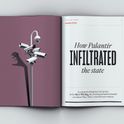A rotten institution
Cressida Dick’s resignation as Met commissioner, after a series of scandals, should revive a long-overdue national conversation. Duncan Campbell’s piece in your March edition documents the corruption that runs deep in policing. The past two years have seen a failed attempt to use coercive powers to police our way out of a public health crisis; the horrifying kidnap and murder of Sarah Everard at the hands of a serving officer; the heavy-handed policing of her vigil; the corrosive racism of stop and search; and most recently the revelation of racist, misogynist and homophobic “banter” between officers at Charing Cross Police Station.
Dick had failed and was right to step down, but new leadership will not change the fact that police powers will always be an invitation to abuse, and marginalised communities will always be at the sharp end of it.
There is another way: invest in mental health services, social welfare, education, housing and youth centres. Treat the causes, not the symptoms. Instead of equipping a rotten institution with more powers and more weapons, work with communities so people can be safe from harm, whether perpetrated by the police or anyone else. And lead from the top: instead of legislating for more police powers or proposing to strip away human rights protections, pursue solutions that are evidence-based, proportionate and effective. That might not grab headlines or stoke culture wars, but it would keep people safe.
Martha Spurrier, director of Liberty
Navigating extremes
Tom Canetti’s flippant comment that the Australian Labor Party “hasn’t been much better” than our political opponents on refugee policy is completely wrongheaded.
Refugee policy is among the toughest challenges faced by Australian leaders. Our nearest border with Indonesia is not a river, but a vast stretch of dangerous ocean. Australia therefore faces fewer irregular arrivals by international standards, but anyone who attempts it risks death.
The right, and its so-called Liberal Party, have embraced the immoral policy of indefinitely detaining people, resulting in children growing into adults in custody with limited hopes of freedom. The far-left Green Party would invite everyone, fuelling the market for asylum seekers to be robbed blind by criminal gangs who would pack them into unseaworthy fishing boats and let them drown.
Between them stands the centre-left Labor Party, which moved to double Australia’s official humanitarian intake through the UN Refugee Agency while working with regional partners to permanently resettle ocean arrivals in third countries like New Zealand and Papua New Guinea. Under a Labor government, those innocents who have been indefinitely detained would have been allowed into Australia for processing and regional resettlement eight years ago.
Kevin Rudd, former prime minister of Australia
A coalition comes unstuck
Max Wind-Cowie identifies a key issue for the Conservative Party as its leader loses his shine: none of the potential replacements seem likely to appeal across the coalition of voters he brought together in 2019. While Johnson’s overall popularity was unexceptional at the time of the election, he was able to unite those who had been flirting with the Brexit Party with Labour voters who “lent” their votes to “get Brexit done.” Though the first group was larger, it was the second that was critical to winning previously unwinnable seats in the Midlands and north.
Holding this coalition of voters together was never going to be easy. Conservative MPs and the more traditional Conservative voters differ substantially from these new Tory voters, both socially (the new Conservatives are more likely to be on lower incomes and to describe themselves as working class) and in terms of economic values. In work conducted by my think tank UK in a Changing Europe, Tory MPs were more economically right wing than the party’s councillors or members and far more so than Tory voters. This is a tension that will come to the fore as the leadership changes and economic issues, such as the cost-of-living crunch, take centre stage.
The electorate remains volatile, and less loyal to political parties than in the past. This provided an opportunity for the Conservatives in 2017 and 2019 to win over “new” voters, but it is also a challenge. As there are no newly forged ties binding these voters to the party, delivery matters more than ever.
Paula Surridge,political scientist
BBC bubble
“Escape the echo chamber” is printed on the spine of my March edition of Prospect. Inside, an article on the two-year freeze of the licence fee complains that the government is “slashing” the broadcaster’s budget and “threatening its future funding” for the sake of “red-meat populist politics.”
The article then presents opinions from 13 “leading figures,” all of whom echo opposition to the government announcement. One of them, the archbishop of Canterbury, implies that the Son of God is on the side of the BBC. I would like an answer to the question asked at the start of the article: where is the calm, rational debate?
James Priestman,Hanwell, London
Parliamentary privilege
Peter Hennessy argues that the Johnson premiership has “created a deep-set belief that ‘it’s one law for you, and one for the rest of us’”. He is correct. But the belief he ascribes to the prime minister and his supporters is not new—it builds on a longstanding attitude of exceptionalism among UK politicians.
MPs benefit from certain privileges designed to enable them to fulfil their role in our democracy—including the right to freedom of speech in parliament and to exclusive control over how the Commons is run. Parliamentarians are unique in their power to make statute and scrutinise the government. But too often, MPs’ awareness of these privileges—exacerbated by parliament’s hierarchical culture and the fact that it happens to be housed in a royal palace—gives them an inappropriate sense of their own special status.
A significant minority of MPs fail to recognise the limits to their privileges. The right to speak freely in debate without fear of prosecution entails the responsibility not to make proven false allegations about political opponents, to tell the truth and to correct any error as soon as possible. The right of MPs to regulate their own affairs obliges them to enforce high ethical standards, which are not simply set aside when they produce the “wrong” outcome. And the privilege of making laws for the rest of the country demands that MPs set an example by following those laws themselves.
Previous scandals—from expenses to lobbying to bullying—have repeatedly illustrated the tendency of individual MPs to exempt themselves from the rules that others follow. What is remarkable now, as Hennessy notes, is the fact that this exceptionalism seems to have become embedded at the very heart of government.
Hannah White, Institute for Government
Path to unity
Iagree, as argued in Andrew Adonis’s article on the rise of Sinn Féin, that the party currently has impressive leadership. There is also considerable hypocrisy in many of those who refuse to work with it. I recall being lacerated by the media—including the nationalist press—when presenting the findings of the 1993 Opsahl Commission, which recommended that Sinn Féin be helped into full participation in the democratic process. It took some time, but the result is the party’s current electoral success. There is, as Adonis’s piece acknowledges, still a whiff of cordite around Sinn Féin and its leaders deserve credit for keeping the majority of the old guard on board. There will come a time when they may have to emulate Éamon de Valera, who distanced himself from his IRA past.
As for the re-unification of Ireland, pursuing this goal is now entirely constitutional and Sinn Féin’s supporters expect it. We need, however, to ask whether Ireland is ready for it—and not only financially. I see few signs of recognition—even among political leaders—of what might be involved. At the time of partition, Ireland’s 7 per cent Protestant population had little choice but to integrate. Even then, sectarianism was rife in Irish Catholic attitudes. How would very large numbers of northern Protestants be welcomed—upwards of800,000—to say nothing of those Catholics who privately identify as unionist?
I for one would welcome re-unification, not least because it would release northern Protestants from the centuries-old condescension of London. But the fears of Protestants should not be dismissed lightly. Is the Irish Republic really ready to abandon its national anthem, with its reference to the “Saxon foe”? To reconsider its tricolour flag, so often the badge of the IRA? To accept that service to the British Crown did not make people any less Irish?
The recent vandalism of the wall in Glasnevin commemorating all sides who died in Ireland’s War of Independence—sullying the otherwise impressive even-handedness of Ireland’s decade of commemoration—suggests we still have some way to go.
Marianne Elliott,professor emerita, Liverpool University
A vote for PR
Peter Kellner’s number-crunching knocks another chunk off the myth that Boris Johnson appeals to voters his fellow Tories cannot reach.
Just look at the last election. According to BBC figures, in her tepid campaign of 2017 Theresa May garnered just over 13.6m votes. Two years later, Johnson’s more rumbustious campaign only added another 330,000; not quite enough to touch 14m. Meanwhile, the Greens increased their vote by a slightly more wall-shattering 340,000, but this proved not enough to bring their lonesome MP a companion.
Both, however, were knocked into a cocked hat by the much-mocked leader of the Liberal Democrats, Jo Swinson, who added 1.3m votes to her party’s tally but lost her own seat, and they were returned with one fewer than in 2017. It was the skew in the constituency system that brought lucky Johnson more reward than he deserved.
Allan Fowlie, via the website
Burning one’s boats
So “the past is not a foreign country for Xi and his generation.” China well remembers its century of humiliation, starting with the Opium Wars and Britain’s seizure of Hong Kong, through to conquest by Japan. Now Xi wants to disprove the tenet “that only democracy can get you a developed, wealthy society.”
But if Xi looks back a further 400 years, to the story of admiral Zheng He, he might see that a centralised state can fail where chaotic democracies succeed. Zheng’s ships, which dwarfed Columbus’s, reached as far as Java and Mozambique and could almost certainly have reached the Americas—even circumnavigated the globe. Far from discovering new lands, Vespucci and Columbus might have been delivering tributes to the Chinese settlers.
But this never happened, because successive Chinese emperors decided to ban such voyages, destroyed Zheng’s ships and the means of building them, and even tried to erase records of the journeys from history. Only an autocratic state could do this; banning the voyages of Vespucci or Columbus would simply have resulted in some other European crossing the Atlantic. Centralised states can be too controlling; sometimes you need to set the spirit of adventure free to make progress.
Hillary J Shaw,via email
Patent benefits
Why should patentees waive the rights they are fully entitled to in inventions made by them and developed at huge cost? If that R&D has been funded to a significant extent by third-party finance, whether private or government, then those funders could and should have stipulated conditions they wanted to apply to the commercial products that resulted, just as the Oxford scientists did in their deal with AstraZeneca.
If they failed to do that in the case of the Covid vaccines, that is no reason to overturn the whole rationale of the patent system, which is to encourage inventors to publish the detail of their inventions to allow others to reproduce them, in return for a limited period of monopoly over their commercialisation.
Richard Burnett-Hall, via the website
Devil’s despair
In your brief encounter, Armando Iannucci points to Satan in Paradise Lost for his most memorable quotation: “evil, be thou my good.”
As a line it is endlessly fascinating. This pompous and ultimately tragic piece of vainglory is spoken before Satan enters Eden in Book IV. Rather than addressing the other devils in the raucous senate of Pandæmonium, he is grieving and “fixes sad” his eyes towards heaven, the place to which he knows he’ll never return.
The full speech is a soliloquy worthy of Shakespeare. It begins with a lament that pride and ambition led him to take on God, but as it continues the speaker transforms from tragic hero to full-blown Machiavel. If an omnipotent deity has decided that the devil is to fall, then the devil will take on his new role with braggadocio: “so farewell Hope, and with Hope farewell Fear.”
That Satan is not the master of his words becomes clear when his once angelic face, disfigured by passion, is spotted by archangel Uriel, who realises how far Lucifer has fallen. As with so many of Satan’s lines, what appears to be a cry of bravado is ultimately no more than a sign of the devil’s despair.
Jason Whittaker, author of “Divine Images: The Life and Work of William Blake”
In fact:
In a poll, 61 per cent of UK adults said they had put on weight during the pandemic. Of those, 89 per cent said they had yet to lose it and 19 per cent have lost hope of getting back to their old weight.
Times, 10th February 2022
An estimated 7 per cent of the Earth’s surface is covered in lichen.
Scientific American, 15th February 2022
The richest ever British prime minister was Edward Stanley (1799-1869), who had the equivalent of about £444m today. Rishi Sunak’s wife Akshata Murthy owns a 0.91 per cent stake in the Indian tech giant Infosys, which is worth more than £700m.
Guardian, 21st January 2022
Tonga has the highest percentage of Mormons of any country in the world—nearly 63 per cent, about the same as Utah.
Salt Lake Tribune, 26th January 2022
The M54 pit stop at Telford has been named the UK’s worst motorway service station, with an average rating of two out of five in online reviews. The Tebay services on the M6 were the best, with 4.24 out of five.
Daily Mail, 13th February 2022
In 2021, Fleetwood Mac’s Rumours (1977) sold 34,593 vinyl copies in the UK, third only to new albums by Adele and Abba.
Irish Times, 12th February 2022
101 MPs were asked the question: if you toss a coin twice, what is the probability of getting two heads? Only 52 per cent gave the correct answer (which is 25 per cent).
Royal Statistical Society, 11th February 2022
Australia is wider than the moon (at almost 4,000km compared to 3,400km).
Cosmopolitan, 12th January 2022
In the US, homes in streets named for the Confederacy (Stonewall Jackson, Dixie etc) sell for 3 per cent less on average than other properties of similar size, age and location.
Bloomberg, 8th February 2022
Chess emerged in India in the 7th century as chaturanga before spreading across the world. The bishop piece started out as an elephant, as it is still called in Russian (slon); it is “fool” (fou) in French and“runner” (läufer) in German. Rook comes from the Persian word for chariot (rukh).
Big Think, 4th January 2022












